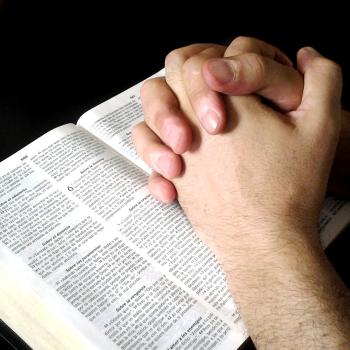Many years ago, I remember seeing a painting of Christ cleansing the Temple from the merchants and moneylenders.

Image via Pixabay
Jesus was centre-stage in the painting, standing on the steps, with a menagerie of animals around him.
His face was stamped with fury, and His arm was cocked back with a massive whip, which He was about to bring crashing down upon a crowd of terrified and pleading merchants who were on their knees before Him, hands outstretched for mercy.
I have never forgotten that image.
The story of the cleansing of the Temple gets used to back up a number of theological arguments:
- It means that it is OK for us to be angry, since Jesus got angry in this scene.
- We too are allowed to “flip tables” and make a scene in certain contexts, since Jesus did.
- Some argue that Christ’s use of the whip on the people means that violence is sometimes justified for the Christ-follower.
- Defying the “powers that be” is permissible and we can take action (including destructive action) to that end.
- The house of God needs a good “cleansing” once in a while.
And no doubt there are others as well.
So what does the Bible actually say about this story? Are any of these conclusions legit?
The cleansing of the Temple is one of the few stories that appears in all four Gospels.
The text in each case is brief. Here is exactly what the Word says in each Gospel account, in its entirety:
12 Jesus entered the temple courts and drove out all who were buying and selling there. He overturned the tables of the money changers and the benches of those selling doves. 13 “It is written,” he said to them, “‘My house will be called a house of prayer,’ but you are making it ‘a den of robbers.’” (Mt 25.12-13)
11 Jesus entered Jerusalem and went into the temple courts. He looked around at everything, but since it was already late, he went out to Bethany with the Twelve…15 On reaching Jerusalem, Jesus entered the temple courts and began driving out those who were buying and selling there. He overturned the tables of the money changers and the benches of those selling doves, 16 and would not allow anyone to carry merchandise through the temple courts. 17 And as he taught them, he said, “Is it not written: ‘My house will be called a house of prayer for all nations’? But you have made it ‘a den of robbers.’” (Mk 11.11; v.15-17)
45 When Jesus entered the temple courts, he began to drive out those who were selling. 46 “It is written,” he said to them, “‘My house will be a house of prayer’; but you have made it ‘a den of robbers.’” (Lk 19.45-46)
13 When it was almost time for the Jewish Passover, Jesus went up to Jerusalem. 14 In the temple courts he found people selling cattle, sheep and doves, and others sitting at tables exchanging money. 15 So he made a whip out of cords, and drove all from the temple courts, both sheep and cattle; he scattered the coins of the money changers and overturned their tables. 16 To those who sold doves he said, “Get these out of here! Stop turning my Father’s house into a market!” 17 His disciples remembered that it is written: “Zeal for your house will consume me.” (Jn 2.13-17)
And that is all.
You may notice that many of the theological conclusions listed earlier involve reading things into the text that simply aren’t there or aren’t clear, including:
- The text never actually says that Jesus is angry. Anger itself is not a sin (Eph 4.26), and there is no problem in thinking that Jesus was angry, as anger can certainly be a godly emotion. And it is certainly reasonable to conclude that He was angry, based on His rebuke. But the text never says it explicitly, never says that He raises His voice, never says that His fury boiled over like so much artwork implies. What if this scene was more like a cop calmly clearing a crowd, “Move along folks, break it up, nothing to see here…”? Now that idea too, of course, is reading into the text something that isn’t there. But we must be aware of inserting anything into the text that isn’t written, including the presumption of His anger.
- Jesus does make a scene, so it must be OK for Christ-followers to do so as well in certain contexts. However, it is also worth noting that Christ never invites His disciples to participate in this scene, nor does He ever command them to act thusly elsewhere. It is possible that Christ is the only one allowed to cleanse His Father’s own house in this particular way, as His Son.
- The verse about the whip in Jn 2.13 makes clear that the whip was to drive out the sheep and the cattle, and not to bring crashing down on the heads of people. Sorry to the artist of that painting I saw, but you got that part wrong!
- Jesus does indeed make a mess in defiance of what was going on. The text doesn’t even make explicit the reason why, other than whatever was happening with the selling was something that He likened to thievery. The general presumption has typically been that the moneylenders and merchants were financially taking advantage of the worshippers through exorbitant pricing – but again, even that is reading more into the text than what is there. The house of God was being turned into a marketplace, a den of thieves. The specifics of how or why are not given.
- This is a religious cleansing, not a political one. This passage regularly gets used to speak of political disobedience against political rulers, but there is nothing in the story to that end. Jesus is not flipping tables in Pilate’s office or Herod’s house or Caesar’s palace. He is fixing a mess in His Father’s house specifically. Do we get to just copy and paste this story into political situations that we don’t like? Not if we are being faithful to the Scripture. There may indeed be a time and place for the Christ-follower to disobey the political rulers, but this story is most certainly not the biblical justification for it.
- Jesus knew that God’s house needed a good cleaning. That is something that stands, and surely is a fair application of this story today. We should always be aware, alert, and even angry at those who would take financial advantage of God’s people for their own wealth and gain. That is not a problem that has gone away since this event.
I find that this story stands as a good example and warning for another reason as well:
Let us be careful not to make assumptions about a biblical text, and let us be careful not to read things that are not there, and let us make every effort to remove our own biases as we read and absorb God’s Word.
In so doing, we are faithful to the Scripture, and to the God who breathed it.
********
If you’ve enjoyed what you read here, you can follow Third Way Christians on Twitter, Facebook and Instagram, or sign up here to get new columns emailed directly to you! As well, you can track along with Chris’ Sunday morning teaching at Meadow Brook Church’s YouTube page!












